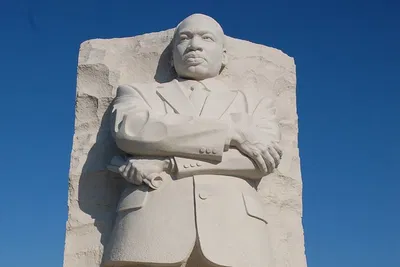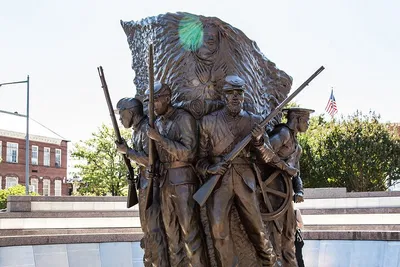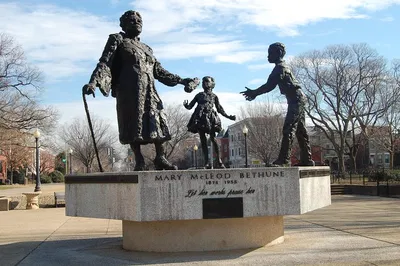DC's Black History: Tour & African American Museum Ticket
210
Overview
The African American History Tour with Museum of African American History Ticket in Washington DC offers a deep dive into the city's rich African American heritage. This tour, operated by KB Tours, explores historic African American neighborhoods across all four quadrants of DC, taking visitors beyond the typical tourist spots.
Visitors can expect knowledgeable guides who share captivating stories and interesting facts about Washington DC's Black history, making the tour both engaging and entertaining. The experience includes visits to iconic landmarks such as the Lincoln Memorial, the Martin Luther King Jr. Memorial, the US Capitol, and the White House. When open, the tour stops at the Frederick Douglass House. A highlight of the tour is a timed-entry ticket to the National Museum of African American History and Culture. To enter museum, visitors must be part of the tour.
This tour provides bottled water and travels in an air-conditioned vehicle, ensuring a comfortable experience. Gratuities are not included. Key stops include the National Council of Negro Women Headquarters, Constitution Hall, LeDroit Park, the African American Civil War Memorial, Dunbar High School, Howard Theatre, Howard University, the Carter G. Woodson House, and the Bethune Council House.




Highlights
Explore DC's Black History: Discover hidden gems and historical landmarks in DC's African American neighborhoods.
Museum Ticket Included: Get a timed-entry ticket to the National Museum of African American History and Culture.
Comfortable Transportation: Travel in a comfortable, air-conditioned vehicle between sites.
Expert Local Guides: Learn from knowledgeable guides passionate about DC's Black history.
Sentiment Analysis
Customers generally enjoyed the tour's informative content and convenient museum access, though some felt the pace was quick.

Customers appreciate the knowledgeable and passionate guides.
Many enjoyed the convenience of having museum tickets included.
The tour provided a comprehensive overview of African American history in DC.
Visitors highlighted the air-conditioned vehicle as a plus during hot days.
Some reviewers noted limited time at certain stops.
A few mentioned that the tour can feel rushed.
The Journey
National Council of Negro Women Headquarters
Visit the historic headquarters of the National Council of Negro Women (NCNW), a National Historic Landmark. Founded by Mary McLeod Bethune in 1935, this building at 633 Pennsylvania Avenue NW has been the NCNW's base since 1953, championing the rights and welfare of African American women and families. Explore the legacy of Bethune and the NCNW's enduring impact on civil rights and social justice.
United States Capitol
Stand on the grounds where President Obama was inaugurated and delve into the complex history of the U.S. Capitol. Uncover stories of the enslaved people who helped build this iconic structure and the White House, and reflect on the Supreme Court decisions made within its walls that profoundly affected people of color for decades.
The White House
Witness the official residence and workplace of the President of the United States. Reflect on the contributions of African Americans to this iconic building, from the enslaved laborers who constructed it to Barack Obama, the first African American President. Explore the layers of history within its walls and its role in shaping American identity.
Constitution Hall
Discover the significance of Constitution Hall, site of the controversial denial of Marian Anderson's concert in 1939 due to her race. Learn about the ensuing national outcry and Anderson's triumphant performance at the Lincoln Memorial, a pivotal moment in the Civil Rights Movement, highlighting the struggle against racial discrimination.
Lincoln Memorial
Reflect at the Lincoln Memorial, where pivotal African American events have unfolded. Hear the story of Marian Anderson's historic concert, Martin Luther King Jr.'s powerful "I Have a Dream" speech during the March on Washington, and Robert Moten's dedication speech at the memorial's opening. Explore the symbolic power of this monument in the fight for civil rights.
Martin Luther King, Jr. Memorial
Contemplate the profound words and legacy of Martin Luther King, Jr. at his memorial. Reflect on the inspiring inscriptions etched on the memorial wall and the symbolism of the Mountain of Despair and the Stone of Hope. Discover the journey of creating this monument, which honors a civil rights leader whose dream continues to inspire.
Frederick Douglass House
Step into the world of Frederick Douglass at his historic home (tours inside are available Tuesday, Wednesday and Saturday). Explore the life and legacy of this abolitionist, orator, and statesman. Learn about his tireless fight for freedom and equality. On other days, a drive past the house will share its history.
LeDroit Park
Wander through LeDroit Park, a neighborhood celebrated for its rich cultural history and progressive past. Originally built for Howard University professors, it became one of D.C.'s first integrated neighborhoods. Discover the homes of prominent African American leaders like Mary Church Terrell and Duke Ellington, and hear about the area's vibrant "Black Broadway" era.
African American Civil War Memorial
Honor the 209,000 African American soldiers and sailors who bravely served during the Civil War at the African American Civil War Memorial. Read the names of the United States Colored Troops (USCT) inscribed on the plaques and admire the "Spirit of Freedom" statue by Ed Hamilton, a powerful tribute to their contribution to the fight for liberation.
Dunbar High School
Visit Dunbar High School, the first public high school for African Americans in the United States, founded in 1870. Explore its legacy of academic excellence and its role in shaping the lives of notable figures such as Mary McLeod Bethune and Paul Laurence Dunbar. This landmark represents a beacon of education and achievement in the face of adversity.
Howard Theatre
Experience the vibrant history of the Howard Theatre, one of the first theaters designed and operated by African Americans. Opened in 1910, it became a haven for black performers and audiences during segregation. The Howard Theatre played a pivotal role in the development of African American music and culture.
Howard University
Drive past Howard University, a historically Black university established in 1867. Notable alumni include Thurgood Marshall, Elijah Cummings, Taraji P. Henson, and Toni Morrison. This university has been a beacon of education and empowerment for generations of African American leaders and innovators.
Carter G. Woodson House
Drive by the Carter G. Woodson House, the home of the "Father of Black History." Learn about Woodson's pivotal role in establishing Black History Month and promoting the study of African American history. This site symbolizes the importance of preserving and celebrating African American heritage.
Bethune Council House
Drive past the Bethune Council House, purchased by Mary McLeod Bethune in 1943, showcases Second French Empire design. This site offers insights into Bethune's life and work, as well as the NCNW's broader impact on civil rights and social justice. Tours inside are available on Thursdays, Fridays and Saturdays, time permitting.
National Museum of African American History and Culture
Conclude your tour with timed tickets to the National Museum of African American History and Culture. Immerse yourself in the stories, struggles, and triumphs of African Americans, exploring exhibits that span centuries of history and culture. The tour concludes upon arrival at the museum, where you can explore at your own pace until closing time.
Know Before You Go
This tour includes bottled water, transportation in an air-conditioned vehicle, and tickets to the National Museum of African American History and Culture. Gratuities are not included. The tour includes visits to multiple historical locations. Participants must join the tour to gain entry to the museum.
Hot Tip
Plan to arrive early at the meeting point. Comfortable shoes are recommended for walking portions of the tour. Consider bringing extra water, especially on warmer days.





